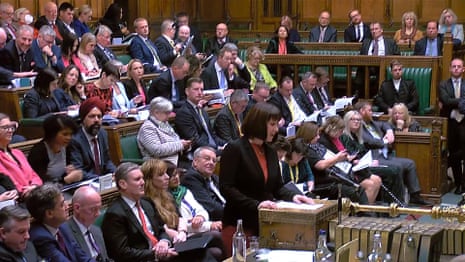Jeremy Hunt has sought to portray the government as a victim of global events as he unveiled a series of tax rises and spending curbs, amid new official forecasts showing that a steep recession will effectively wipe out eight years of growth for Britons.
In a lengthy and policy-packed autumn statement – a budget in all but name – the chancellor said GDP was forecast to contract by 1.4% next year, with inflation to remain above 7%.
While Hunt announced inflation-level increases to working-age benefits and pensions, insisting he was taking a “compassionate” and balanced fiscal approach, parallel forecasts released by the Office for Budget Responsibility (OBR) made for grim reading.
What is ‘fiscal drag’ and how has Hunt used it in his autumn statement?Read more
Even with extended support for energy bills, also announced by Hunt, overall living standards are predicted to fall by 7% over the next two years, effectively removing the past eight years of growth.
The OBR said the UK economy would shrink by 2% over the totality of a recession, which started earlier this year and is expected to last just over 12 months, with house prices forecast to drop by 9% by 2024.
Hunt sought to put off much of the pain to future years, protecting NHS and education budgets for now, and to distance the government from some tax hikes by allowing local authorities to hike council tax by up to 5% without a local referendum.
While the chancellor squarely blamed the economic crisis on global factors such as Covid and Russia’s invasion of Ukraine, the OBR forecasts told a notably different story.
Rising interest rates, in part sparked by the disastrous mini-budget under Liz Truss, meant government debt was expected to be £400bn more in 2026-27 than forecast in March, the ORB said, about 18% of UK GDP.
In a scathing response, Rachel Reeves, the shadow chancellor, called Hunt’s measures an “invoice for the economic carnage” caused under Truss, saying no similar economies were having to curb spending.
In a near-hour long speech that ranged broadly and announced a string of measures, many of them much-trailed and widely expected, Hunt announced extended, if limited, measures to help people with energy bills beyond April, and inflation-level increases in working-age benefits and pensions, protecting the so called pension triple lock.
The benefit increase alone would cost £11bn, Hunt said, but “speaks to our priorities as a government and our priorities as a nation”.
Hunt also announced a cap on rises to social rents and a 9.7% rise in the “national living wage”.
Setting out what he called “a plan to tackle the cost of living crisis and rebuild our economy”, Hunt said his measures, including a range of tax rises through freezes or cuts to allowances and “efficiencies” in public services, would reduce inflation and limit the scale of the downturn.
He set out what he said would be a combined £55bn in tax increases and spending cuts, including a reduction in the threshold for the top 45p rate of income tax from £150,000 to just over £125,000, and a freeze on allowances and thresholds for income tax, national insurance and inheritance tax for a further two years, to April 2028.
Electric vehicles would no longer be exempt from vehicle excise duty, he added. An extended windfall tax on energy firms, including a temporary levy on electricity producers, would raise £14bn, Hunt said. As a balance, a similar sum would be spent to benefit about 700,000 companies with reduced business rates.
skip past newsletter promotion
Sign up to First Edition
Free daily newsletter
Our morning email breaks down the key stories of the day, telling you what’s happening and why it matters
Enter your email address Enter your email address Sign upPrivacy Notice: Newsletters may contain info about charities, online ads, and content funded by outside parties. For more information see our Privacy Policy. We use Google reCaptcha to protect our website and the Google Privacy Policy and Terms of Service apply.
after newsletter promotion
Chancellor extends energy windfall tax to ‘low carbon’ generatorsRead more
Announcing what he insisted would amount to real-terms increases to the NHS and education, Hunt said public services would be protected, seeking to see off accusations that he was ushering in a new era of austerity. Capital budgets would be protected, he added, but not in real terms.
In response, Reeves lambasted Hunt for seeking to blame global factors for his decisions. “The chancellor should have come here today to ask for forgiveness, at the very least he could have offered an apology, but no,” she said.
“All the country got today was an invoice for the economic carnage that this government has created. Never again can the Conservatives be seen as the party of economic competence.”
“The mess we are in is the result of 12 weeks of Conservative chaos, but also 12 years of Conservative economic failure.”
 00:01:44Rachel Reeves criticises chancellor for not changing non-dom tax rules – video
00:01:44Rachel Reeves criticises chancellor for not changing non-dom tax rules – video
Hunt had repeatedly argued – to opposition jeers – that much of the reason behind the need for the measures was down to global factors, beginning his speech by saying it was being made “in the face of unprecedented global headwinds”.
International events, notably Russia’s invasion of Ukraine, was “the primary cause” of inflation forecast to be 9.1% over 2022 as a whole and 7.4% next year, the chancellor said.
Other OBR forecasts showed the economy was forecast to grow by 4.2% in 2022, but fall by 1.4% in 2023, then rising slowly in the coming years.



